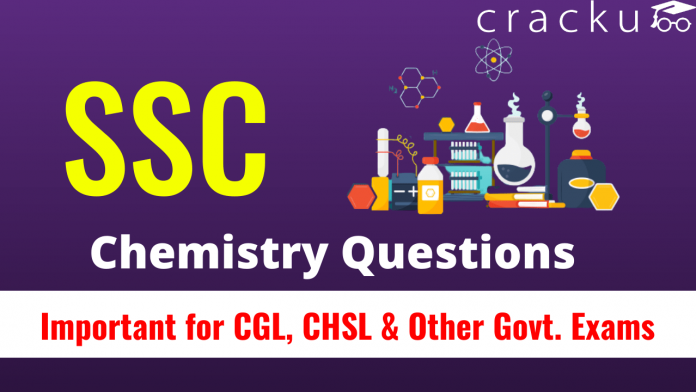


Download the most important Top-25 SSC Chemistry Questions in the upcoming SSC exams. These questions on based on the previous most repeating type of questions. If you preparing for the SSC exams like CGL, CHSL, MTS & other competitive exams these questions are very useful & may helpful for you in online preparation exams.
Watch video explanation:
Question 1: Which substances are represented by the pH scale showing a value below 7?
Question 2: Acid Rain has pH value of
Question 3: Which alloy is used for making cutting tools and crushing machines?
c) Stainless steel
Question 4: Which among the following will be a negative ion?
a) If it has more electrons than protons
b) If it has more electrons than neutrons
c) If it has more protons than electrons
d) If it has more protons than neutrons
Question 5: The process that takes place in the galvanic cell is:
a) chemical energy is transformed into nuclear energy
b) nuclear energy is transformed into electrical energy
c) chemical energy is transformed into electrical energy
d) None of these
Question 6: In the year 1817 ______ tried to arrange elements with similar properties into groups.
c) Henry Moseley
Question 7: Dry Ice is nothing but
a) Gaseous carbon dioxide
c) Solid carbon dioxide
d) Carbon monoxide
Question 8: How is the iron container or vessel galvanized?
Question 9: What happens during an endothermic reaction?
a) Heat is absorbed
b) Heat is released
c) Heat is neither absorbed nor released
d) Temperature remains constant
Question 10: The metal that can be cut with a knife is:
Question 11: In a diamond, each carbon atom is bonded to:
a) two other carbon atoms
b) three other carbon atoms
c) four other carbon atoms
d) five other carbon atoms
Question 12: Which of the following chemicals is NOT considered toxic?
Question 13: What is the pH value of Sodium Hydroxide?
Question 14: One Mole of any Gas at standard Atmospheric Pressure (STP) will have a volume of ____?
Question 15: Which is the Metal also known as“Quick Silver”?
Question 16: Who is the scientist credited with the discovery of the covalent bond ?
a) Linus Pauling
c) Gilbert N. Lewis
d) Antoine Lavoisier
Question 17: Most commonly used foaming agent in Fire Extinguishers is ________ ?
a) Aluminum Hydroxide
b) Potassium Hydroxide
c) Magnesium Hydroxide
d) Calcium Hydroxide
Question 18: Which of the following are the properties which do not rely on either the size of the system or quantity of the matter present in it but only depends on the nature of substance/matter present in the system?
a) Intensive properties
b) Isochoric properties
c) Extensive properties
d) Adiabatic properties
Question 19: In which of the following processes is Oxygen released as a by product?
Question 20: Which of the following is used extensively as aviation fluid?
Question 21: Isotopes of an element have-
a) Different atomic numbers
b) The same physical properties
c) Different number of neutrons
d) Different chemical properties
Question 22: Evaporation of material takes place-
a) Above its melting point
b) Above its boiling point
c) Below its melting point
d) Below its boiling point
Question 23: What is the chemical name of milk of magnesia?
a) Ammonium hydroxide
b) Sodium hydroxide
c) Magnesium hydroxide
d) Calcium hydroxide
Question 24: What is the range of pH scale?
Question 25: Which element has two shells, both of which are completely filled with electrons?
Answers & Solutions:
1) Answer (D)
2) Answer (A)
3) Answer (A)
4) Answer (A)
5) Answer (C)
Chemical energy is transformed into Electrical energy in a galvanic cell.
6) Answer (A)
7) Answer (C)
8) Answer (D)
Galvanization or galvanizing is the process of applying a protective zinc coating to steel or iron, to prevent rusting. The most common method is hot-dip galvanizing, in which the parts are submerged in a bath of molten zinc.
9) Answer (A)
An endothermic process is any process which absorbs energy from its surroundings, usually in the form of heat.
10) Answer (A)
11) Answer (C)
12) Answer (C)
13) Answer (C)
14) Answer (A)
15) Answer (C)
16) Answer (C)
17) Answer (A)
18) Answer (A)
19) Answer (B)
20) Answer (B)
21) Answer (C)
22) Answer (D)
23) Answer (C)
24) Answer (A)
25) Answer (D)